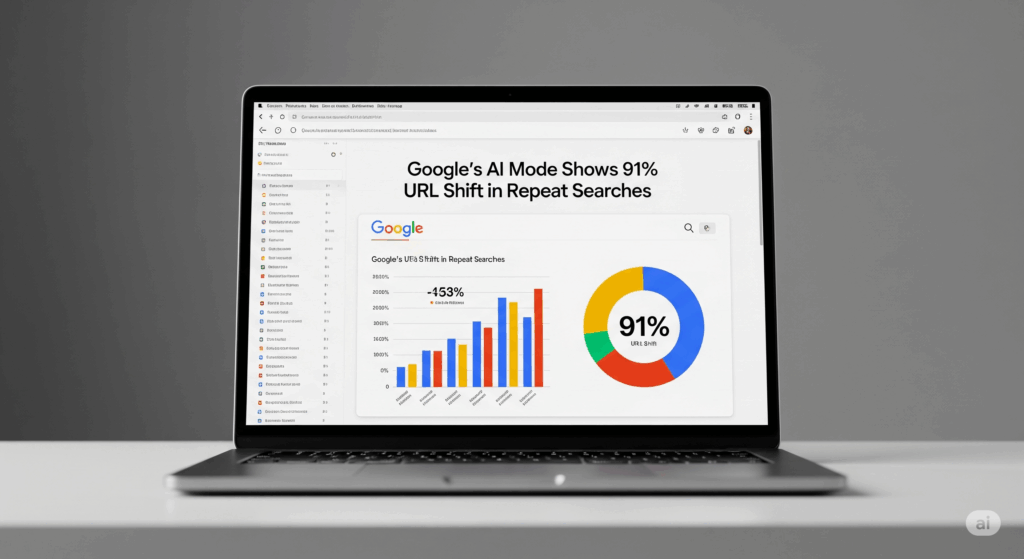Ever hit that search button on Google, found exactly what you needed, and then, for curiosity’s sake, tried the exact same search again later, expecting the same results? If you’ve been using Google AI Mode, that expectation might be a thing of the past. A fascinating new study has unveiled a startling statistic: Google AI Mode can show a whopping 91% URL change across repeat searches for the exact same query. That’s right, almost every time you ask the AI the same question, it’s likely pulling its answers from a largely different set of web pages.
This isn’t a bug; it’s a feature, or at least a consequence of how this advanced AI works. It’s a clear signal that the future of search is far more dynamic and less predictable than the familiar “ten blue links” we’ve grown up with. So, buckle up, because we’re diving deep into what this volatility means for you, your online experience, and how businesses need to adapt.
Understanding Google AI Mode: Beyond Traditional Search
Before we dissect the “91% change,” let’s quickly recap what Google AI Mode is. Think of it as Google’s super-powered, conversational search experience. Unlike traditional search that gives you a list of links, AI Mode aims to provide a comprehensive, AI-generated answer directly on the search results page, often with follow-up questions and cited links to delve deeper. It’s powered by Google’s advanced Gemini model and uses a “query fan-out” technique, breaking your question into multiple subtopics and searching for them simultaneously across a vast array of web sources.
It’s designed to handle complex, nuanced queries that might have previously required multiple searches. You can interact with it like a chatbot, asking follow-up questions, using voice, or even images. It’s essentially Google’s vision for a more intelligent, conversational, and integrated search experience, moving “beyond information to intelligence.”
The Big Reveal: 91% URL Change – What’s Happening?
The recent study by SE Ranking, based on an analysis of 10,000 keywords, has shed light on the inherent variability of Google AI Mode’s results. When the same queries were run multiple times, the AI frequently cited different URLs, even from the same domains. Specifically:
- Low Consistency: Only a tiny 9.2% of URLs remained consistent across three different sessions for the same query on the same day. That’s a huge shift!
- Domain Volatility: Even at the domain level, consistency was low, around 14.7%. This implies that while the website might sometimes be the same, the specific page being cited changes frequently.
- Minimal Overlap with Organic Results: The study also found very little overlap between the URLs cited by AI Mode and those appearing in the top 10 traditional organic search results – sometimes as low as 14% URL overlap. This suggests that AI Mode isn’t just summarizing the top-ranking pages; it’s pulling from a much wider and often different pool of content.
- Zero Overlap: In a significant 21.2% of cases, there were no overlapping URLs at all between three sets of responses for the exact same query. Imagine that!
Why So Volatile? The AI’s Learning Curve
This high degree of variability isn’t necessarily a flaw; it’s an inherent characteristic of how large language models (LLMs) operate and how Google is trying to refine its AI. Several factors contribute to this dynamic behavior:
- Continuous Learning and Adaptation: The underlying machine learning models are constantly learning and adapting to new data, nuances, and user feedback. This continuous refinement can lead to different outputs even for identical queries over time.
- Query Fan-Out: As mentioned, AI Mode breaks down complex queries into multiple sub-intents and searches for them simultaneously. The specific combination of sources it prioritizes for synthesis can change with each iteration, leading to different URLs being cited.
- Personalization and Context: While not explicitly detailed as the sole driver for the 91% change, AI Mode can factor in user interactions, location, and potentially other contextual cues. What one user sees might be different from another, and even the same user might see different results based on subtle changes in context or the AI’s evolving understanding.
- Broadening Sources: Unlike traditional search that might focus on a more stable set of “top-ranking” pages, AI Mode seems to be pulling from a much wider universe of relevant content, giving it more options to draw from.
What This Means for You: The User Experience
For the average user, this volatility can be a mixed bag:
- Fresh Perspectives: You might get fresh, diverse perspectives on a topic each time you search, potentially uncovering new information or angles you hadn’t considered.
- Less Consistency: If you’re looking for a specific, stable answer or a definitive source that you can revisit, the inconsistency might be frustrating. It means you might not get the exact same cited links even if you search for the same thing moments later.
- Trust and Verification: The importance of critically evaluating the AI’s responses and clicking through to the cited sources becomes even more paramount. The AI is synthesizing information, and while it provides citations, the dynamic nature means you need to verify if the presented information truly aligns with your needs from the sources provided.
The SEO Earthquake: Implications for Businesses and Marketers
This study sends significant ripples through the SEO (Search Engine Optimization) and content marketing world. The old playbook focused on achieving a stable top ranking for specific keywords. Now, the rules are changing:
- Tracking Visibility Becomes Complex: Traditional rank tracking tools, which monitor consistent positions, will struggle to paint an accurate picture of visibility in AI Mode. Since URLs are constantly shifting, how do you measure “ranking”?
- Focus on Domain Authority Over Page Rank: Instead of obsessing over individual page rankings, the emphasis shifts to domain-wide authority and topical relevance. If AI Mode is pulling from a broader set of trustworthy domains, being a recognized authority in your niche becomes critical.
- Content Diversification is Key: Businesses may need to diversify their content across various trusted platforms. Being cited on Wikipedia, Reddit, or YouTube (which frequently appear as sources) might become as important as having a top-ranking blog post.
- The “Zero-Click” Phenomenon Intensifies: If AI Mode provides a comprehensive answer directly, users might not need to click through to any external websites. This further amplifies the “zero-click search” trend, where the answer is provided directly on the SERP, potentially reducing organic traffic to websites.
- Optimizing for “Answerability”: Content needs to be structured in a way that makes it easy for AI models to understand, interpret, and synthesize. This means clear headings, direct answers to common questions, well-structured data, and semantic depth. It’s about being “AI-friendly.”
- Real-time Relevance: The AI’s continuous learning means content needs to be consistently updated and maintained for real-time relevance, rather than being a static piece of information.
- Beyond Keywords: Intent and Context: While keywords still matter, optimizing for the user’s underlying intent and the broader context of their query becomes paramount. The AI is trying to understand what the user really wants to know.
- Local SEO Remains Crucial: The study noted that Google properties, especially Google Maps business profiles, were highly cited, especially for local queries. This reinforces the importance of robust local SEO strategies.
Embracing the AI Era: A Call to Adapt
The 91% URL change is a loud and clear message: search is no longer just about algorithms; it’s about dynamic, evolving AI. This shift is both a challenge and an opportunity. For content creators and businesses, it means moving beyond rigid SEO tactics to a more fluid, holistic approach that prioritizes:
- Building unparalleled domain authority and trust.
- Creating genuinely helpful, high-quality, and comprehensive content.
- Structuring content for AI readability and answerability.
- Diversifying presence across various credible online platforms.
- Understanding and adapting to user intent and personalization.
The future of search is here, and it’s conversational, intelligent, and, yes, wonderfully unpredictable. It demands a new level of sophistication and adaptability from anyone aiming to be visible online. It’s an exciting time to be in the digital space, where ingenuity and relevance will truly shine.







